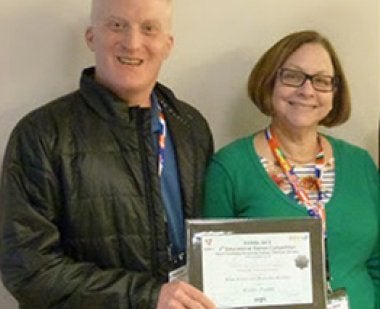
COLLEGE PARK, MD (December, 2015) An app-based game for students learning about scientific inquiry developed by Dr. Diane Jass Ketelhut, an associate professor in the Department of Teaching and Learning, Policy and Leadership, placed second in a game competition at the ninth European Conference on Games Based Learning, held this October at Nord-Trøndelag University College in Steinkjer, Norway.
For this year’s conference, which brings together dynamic scholarship on learning through games from all over the globe, Dr. Ketelhut submitted a SAVE Science module called “Weather Trouble,” which she had designed in collaboration with Dr. Brian Nelson, an associate professor with the School of Computing, Informatics, and Decision Systems Engineering at Arizona State University.
Funded by the National Science Foundation, SAVE Science investigates immersive games’ potential for assessing science learning with a more accurate reflection of scientific complexity than typical tests allow. Students have an overall goal of uncovering likely contributors to problems facing a small virtual town set in a medieval / fantasy-themed country. Participants complete the games by interacting with characters and objects, collecting and analyzing clues, and using their existing understanding of both content and scientific inquiry to draw inferences.
The main purpose of the “Weather Trouble” module is to assess student knowledge of weather and climate concepts, as well as aspects of scientific inquiry. Students enter a single-player virtual town – Scientopolis – in the midst of a drought. They help a farmer figure out why there has been no rain and whether the drought will continue. To investigate the problem, students can interact with characters in three different areas to obtain information about conditions there. Students can also gather information about weather and climate conditions by using tools such as barometers, temperature gauges, wind vanes, recent weather forecasts, recent paintings of the country, and observations of moving clouds. And to support their scientific investigation, students can compare measurements and observations from the three different areas within the game.
Since 2009, nearly two thousand middle school students across the United States have participated in SAVE Science.
Dr. Diane Jass Ketelhut is an associate professor in the Department of Teaching and Learning, Policy and Leadership. She holds certification in secondary school science and was a curriculum specialist and teacher of mathematics and science in grades 5-12 for fifteen years. She earned her Ed.D. in Learning and Teaching from Harvard University.
Dr. Brian C. Nelson (Arizona State University) conducts research on the theory, design, and implementation of computer-based learning environments, focusing on immersive games. An instructional designer and learning theorist, he has published and presented extensively on the viability of educational virtual environments for situated inquiry learning and assessment. He was project designer on the River City Virtual World project through two NSF-funded studies, and is a co-principal investigator on the on-going NSF-funded SAVE Science and SURGE studies.
-end-
For more information on the College of Education, visit: www.education.umd.edu
or contact
Joshua Lavender, Communications Coordinator, at: lavender@umd.edu



